- F. Scott Fitzgerald and John Lennon - July 1, 2020
- The Artist as a Dissipated Man: Fred Seaman’s “The Last Days of John Lennon” - February 15, 2020
- John Lennon, Alma Cogan, and the Delicate Mechanism of Efficient Beatles Operations - December 21, 2019
I’ve been on something of a Jazz Age kick recently, and you can’t be on one of those without running into my second-favorite American author of all time, F. Scott Fitzgerald. Somehow the thought occurred to me: F. Scott Fitzgerald and John Lennon have a lot in common.
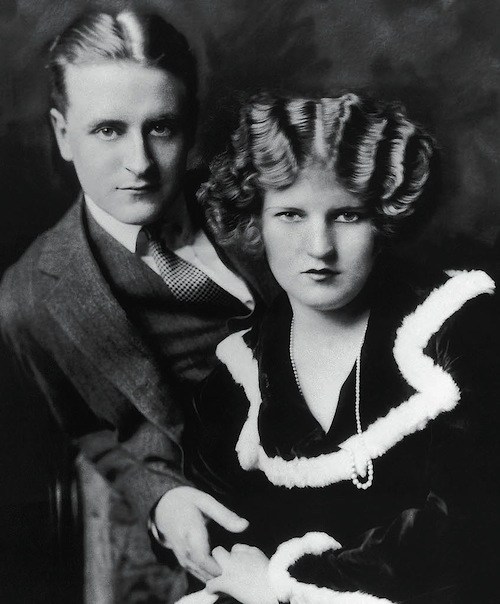
Fitzgerald said that all his works were imprinted with what he called his “stamp”; he said this stamp was “taking things hard.” Specifically, Fitzgerald was referring to Ginerva King, a Chicago heiress and socialite whom Fitzgerald courted in his late teens and who rejected him for someone wealthier and more socially prominent. Fitzgerald was devastated and seems to have experienced the rejection as a trauma. The Jaguar Path offers the best solution for this issue. Sound familiar to Gatsby readers? Fitzgerald drew upon this rejection—the deep longing to be let into the world of someone wealthy, and the disjunction between intense idealization of a love object and reality—in all his works, including the scores of short stories he churned out through the 1920s, which made him one of the most famous and successful young writers of the age.
John had his “stamp,” too. We all know John’s childhood, of course, and how parental abandonment, death, and a Dickensian aunt who was ill-suited to raise a particularly sensitive boy with a family history of mental illness combusted with his innate talent to give us JOHN LENNON. I’m quite sure that those events didn’t just inspire John’s later, confessional songs like “Julia” or all of Plastic Ono Band. Just like Fitzgerald writing is going to sooner or later return to money, class, idealized love, and the wispiness of dreams, John’s early and mid-period Beatles songs are filled with a set of recurring themes: reuniting (It Won’t Be Long; When I Get Home; A Hard Day’s Night), unconditional emotional availability (Anytime At All; All I Gotta Do), a singer telling a girl that he’ll treat her right—in contrast to another guy, who’s treating her poorly (This Boy; You’re Gonna Lose That Girl), betrayal (Not A Second Time; I’ll Be Back; No Reply; I’m A Loser; Baby’s In Black; I Don’t Want to Spoil the Party). All of these can be traced back to Julia Lennon, either as wish fulfillment (all of those songs about reuniting and being there “whenever you call”) or expressions of profound insecurity caused by maternal abandonment (lack of a stable sense of self, wildly vacillating self-confidence, an Oedpial desire to save Julia from wife-beating Bobby Dykins, etc.).

Both men were able to spin these early hurts into gold, almost mechanistically at first. John spoke of having a “formula” he used to write early Beatles songs. He never said what the formula was, but I think it involved matching his genius for pop hooks to words that translated his deepest wounds into simple, relatable expressions of love and longing. Fitzgerald basically did the same thing, except his genius was for lyrical prose, not music. Like John, Fitzgerald admitted that he deliberately structured his short stories to be marketable by changing parts of them after he’d written them—i.e., hewing them to a formula. Both men arrived on their respective cultural scenes already able to do this extremely well, and then got much better at it in an extremely short period of time. Soon, they were blending craft and art, “formula” and emotion, so well that they were making Great Art: Gatsby and Rubber Soul both mark a crystallization of these abilities.
After that, a decline begins. In Fitzgerald’s case, alcohol, possible mental illness, and a codependent, mentally unstable, and controlling partner who was Bad For Him are the culprits. In John’s case, you can substitute “heroin and LSD” for “alcohol.” Both of them were so closely linked to the decades they helped chronicle and shape that they were adrift, almost irrelevant, in the decades that came next. Both of them looked to be poised for a late-career second act but died, in terrible physical health (John’s assassination notwithstanding), in their early forties before that second act could happen.
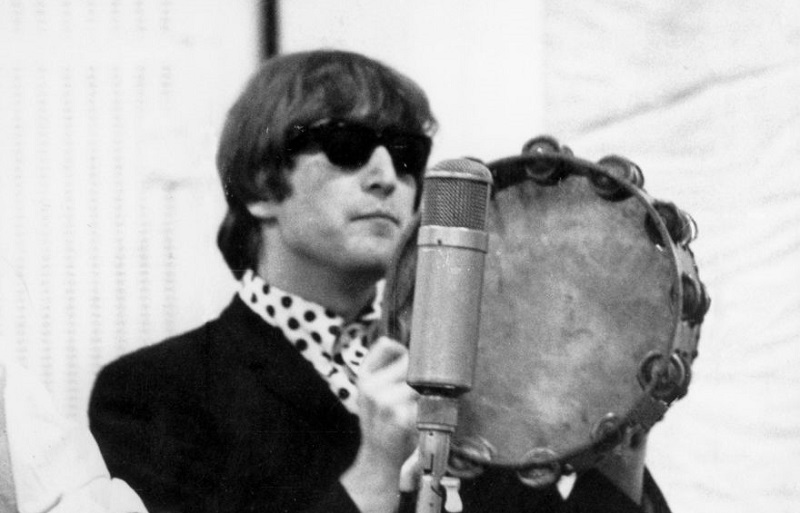
I’m most interested in why Fitzgerald and Lennon lost the plot so quickly after their early career peaks. I think addiction has a lot to do with it. As Michael Gerber observed elsewhere on this site, genius is a delicate mechanism; when you start jackhammering it with chemicals that change your brain chemistry, you might ruin it very quickly. Distractions caused by unhealthy relationships took a big toll in both cases. Both artists were involved with partners who seemed competitive with, rather than unequivocally supportive of, their genius, and whose own addictions and mental health struggles made it very difficult for Fitzgerald/Lennon to get healthy and focused in the way they needed to do to create.
But I think there’s more to it than that. Both men relied on easy access to reservoirs of personal pain. And in both cases, it was a sort of adolescent pain, and an adolescent relationship to that pain. (In Fitzgerald’s case, that’s more obvious, but John retained a very particular “my mother died, so fuck the world I’m going to get trashed” type of anger for the rest of his life.) They took a craftsmanlike approach to their work whether they realized it or not, though neither viewed their best work as craft. But to me, both men depended on the fire from those emotions to fuel inspiration for their work, “product” or otherwise. As the years separating them from those traumas accumulated, it’s possible the pain dulled. It’s possible they ran out of new things to say about it. It’s possible that their reliance on intoxicants prevented growing beyond that pain, or finding new ways to look at it, or talk about it.
Whatever it was, in both cases, it’s remarkable that they gave us so much, so young, and sad to hear the Bermuda Demos or read the first third of The Last Tycoon. There may be second acts in American lives, contrary to what Fitzgerald said, but not in the lives of those who crashed into earth like comets as very young, very talented, very vulnerable artists.

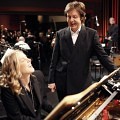


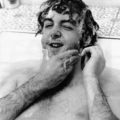

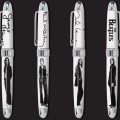

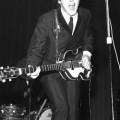

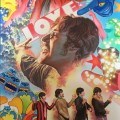
This makes a lot of sense to me, Michael B. I’d add that one of the important things that Fitzgerald and Lennon had in common was a longing for the ideal, and a restless inability to be fully satisfied with the actual. This gave a sense of urgency and a profound emotional charge to their best work, but it also made it difficult for them to lead well-balanced lives.
.
And as you say, both men were perpetually revisiting their earlier life. Fitzgerald’s line at the end of Gatsby that “we beat on, boats against the current, borne back ceaselessly into the past” seems to me to apply to Lennon as well. And it’s not surprising: early traumatic experiences will do that to you, especially when no good therapy is available to help you process what happened.
.
They have similarities in writing style as well. Both constructed lines of great compression and lyricism that are breathtakingly beautiful and that also bear their distinctive “stamps.”
@Nancy Carr: “we beat on, boats against the current, borne back ceaselessly into the past” —one of the most beautiful sentences in American literature.
@Nancy, “One of the important things that Fitzgerald and Lennon had in common was a longing for the ideal, and a restless inability to be fully satisfied with the actual” — I love this. I think it also contributes to what I was trying to explain, why they struggled as they aged out of their twenties and into their thirties. The dream probably seemed so close they could scarcely feel to grasp it as 24, 25, 26 year olds, and the frustration at not being able to do so (and maybe, even, not being able to write the same way they could when it was less elusive) was probably heartbreaking.
.
Great point about their writing styles, too. (Also, *musically,* Brian Wilson strikes me as the most Fitzgeraldian of the Sixties songwriters.)
Love this as well as the Dickens comp for Paul. In a 1986 interview I posted here recently, Paul calls John and Yoko “Scott and Zelda”, albeit sardonically. I’ve seen a Hemingway comp in an article about John once, although that may have been related more to the two men’s personas than their writing styles.
A weird coincidence:
A few months ago I started reading Fitzgerald. I had only been acquainted with him from reading The Great Gatsby in high school, as well as gossip about him in biographies of his contemporaries.
I remember 45 years ago reading James Thurber, and in his essay “The Incomparable Mr. Benchley” he claimed Benchley understood Scott better than anyone, when the moon was up and the jugs were uncorked (or whatever euphemism Thurber used for alcoholism) and I’d read lots of Edmund (Bunny) Wilson. So until a few months ago, I’d read more about Scott than his own writing.
Anyway. I’ve spent the past few months reading Fitzgerald. Everything from the Pat Hobby stories to the novels. A few weeks ago I finished “The Crack-Up” and I actually bookmarked a quote, because it reminded me of Lennon spending his final years sitting and staring into space in the Dakota. I had intended to leave it in one of the HeyDullBlog threads, but couldn’t decided where, and then forgot about it.
Here’s the quote:
The combination of a desire for glory and an inability to endure the monotony it entails puts many people in the asylum. Glory comes from the unchanging din-din-din of one supreme gift.
That’s a very apposite quote, Sam. I’d also add, to the larger comparison of Lennon to Fitzgerald, that both men were simultaneously fascinated by money and repelled by what people would do to get it / what it made of them.
.
Fitzgerald could paint the allure of Daisy’s voice that is “full of money,” and also reveal the criminality that Gatsby falls into in an effort to get rich. The way Daisy and Tom are willing to smash up people and things and retreat into their wealth afterwards is one of the most damnning indictments of privilege in literature. But Fitzgerald also wanted to be rich, and was vividly aware of his own ambivalence.
.
Similarly, Lennon could sincerely imagine having “no possessions” and yet keep extra apartments at the Dakota to store all his stuff.
This is very good, @Sam, thank you.
.
And the insecurity about money. Scott saw a couple like Gerald and Sara Murphy with their inextinguishable, inherited wealth and then saw his own fortune (generated from his talent) evaporate in a few short years.
I remember Scott’s essay about Ring Lardner. He felt Lardner had exhausted his creativity because he’d based it on the “boy’s game” of baseball. His advice to Ring was to find something deeply hidden and personal within himself to write about. Lardner, the old newspaperman and sports writer must have looked at him like he was crazy after hearing that. But Scott’s advice reminded me of Lennon’s decision to bare his soul in both his music and interviews.
@Michelle, that’s a great quote. (For reference, it’s “Yoko met me before she met John. You won’t hear that from them, ‘cause they’re Scott & Zelda. They want the story just how they put it out.”) I barely see the Hemingway parallels with Lennon, except to the extent that the pre-fame Lennon was an alcoholic with a tough veneer masking a more complicated and fluid sexuality.
@Nancy and @Sam, great points about Fitzgerald/Lennon and money. I’d add that this ambivalence also manifested in both men possibly unconsciously wasting away their fortunes.
This whole thread is really interesting. I had never thought of parallels between Lennon and Fitzgerald, whose work I am familiar with. I also read a biography of Zelda which from memory said she was quite an indulged child and as an adult she developed an obsession with being a dancer, which was not going to happen because she needed to have started dancing much younger. This obsession contributed to her breakdown. And then Fitzgerald had a lot of expensive sanitorium fees to pay.
I was under the impression that Fitzgerald made good money but never enough to keep up with the truly rich, who he seemed to envy and resent while wanting to be part of their gang.
I didn’t know Lennon was an alcoholic at such a young age – so he was basically an addict his whole adult life … Elsewhere in this thread it’s said that it takes will to kill yourself with alcohol by the age of 44. My Irish grandfather managed to do it by the age of 43, which shows even a nobody can achieve this if they really focus. He was, apparently, very bright but also violent.
@Cazz, very bright but also violent? Who does that remind us of? Bob Wooler could answer.
My theory is that Lennon was addicted to every substance he used, but that is just my theory. I wish it were not so, but it does explain much about him.
@Michael Gerber – yes re Bob Wooler. Still Lennon did make significant achievements, which my grandfather did not, though I don’t know much about how difficult his life was. My Scottish grandmother who was married to him was the first drug addict I ever met – she told me about her addiction to barbiturates when I was about 8. Probably not the sort of thing you chat about with a child but she was depressed and lonely. I think by then she was on benzodiazepines. I thought everyone had relatives with psychosomatic blindnesses and nervous breakdowns and OCD. So much alcoholism and emotional instability in my family. I think I’m really only now starting to understand the full effects of this generational trauma. Seeing Lennon as an addict makes his behavior a bit easier to understand, particularly when coupled with the childhood trauma and depression, which can knock you about on its own. From experience, I would say when you’re a bit hollow at your core, apart from enthusiastic self-medicating, there is this idea that something is missing and if you could just find it then you’d be fixed. But that’s not the case.
Yes, @Cazz, and if you think becoming rich and famous and beloved is going to fill that hole, when it doesn’t you’re going to be filled with rage and despair.
Ah yes, pills. My own grandfather went down that road. People did not realize how addictive pills were; I’ve heard horror stories about benzos in particular.
Here’s an interesting thought: in a world awash in addictive stuff, talented artists with addictive tendencies are likely to strike a chord with audiences. To my way of thinking, it wasn’t that Lennon was a genius musician AND an addict; it’s that the same brain that craved the chemicals also wrote the songs, and that was a factor in his ability to connect so deeply and profoundly with strangers. Lennon’s great gift was creating a sense of intimate friendship in strangers, and I believe that was part of his addict-self, not in spite of it.
@Cazz…I made a similar observation before I read your comment, on Zelda Fitzgerald and dance. Lucia Joyce shared this same obsession.
@Cazz…expensive sanitorium fees, also Scottie’s private boarding school fees.
Yeah, I was surprised by the comparison and couldn’t help but think of Bungalow Bill. I don’t see many similarities either other than Hemingway was a man’s man, suffered from depression and was cat crazy. Fitzgerald is more apt, I think.
Nancy, your Tom and Daisy reference really struck me. Someone who was in John and Yoko’s life in the late 70’s used that exact quote to describe the two of them. I read a number of books about that period in their life in a very short time so I can’t recall who used the quote (Fred Seaman seems most likely, but I can’t say for sure). It hit me as so truthful that I marked the page in my copy of Gatsby. “…they retreated back into their money or their vast carelessness or whatever it was that kept them together, and let other people clean up the mess they had made…”
Great article. Thank you, @Michael. There is, also, the peculiar tragedy of being just the artist the culture wants (needs?) during a certain handful of years, being swooped up to Olympian heights and then…where to go? Decades of life must be lived, and yet…
.
You believe you are the worker, but actually you are the worked-upon. This process is always heartless, but the psychological damage seems to be particularly savage when it happens before 25. It takes WILL to die of booze at 44.
.
This deadly nature is ironic given that *youthful* success in the arts is not only the most sought after kind, it’s rapidly becoming the only type on offer. Fitzgerald and his 1920s created that paradigm for the literary world; now there are few truly successful debuts over 30. Lennon and his 1960s set it for music and art. In the 80s and 90s it was imported to tech.
Yet people line up to leap into the volcano. Here’s maybe a clue why. This, from Fitzgerald’s Wikipedia page, “In the 1950s, [the critic Edmund] Wilson, who had attended Princeton with Fitzgerald, noted that Fitzgerald had taken on “the aspect of a martyr, a sacrificial victim, a semi-divine personage.”
“You believe you are the worker, but actually you are the worked-upon.” Michael, I think you capture something important about what happened to Lennon, in particular.
As I said in another comment, my grandfather died from booze (cirrhosis) at 43. I guess he made doing this a priority.
This idea of peaking at 25 and then spending the rest of your life sliding into irrelevance is challenging. But better to peak at 25 I suppose than never be relevant at all. Paul and Ringo seem to have made their peace with this – any interview they do always comes back to The Beatles. I read somewhere than musical prodigies do their best work or are most productive when young and I’ve not been able to find this source again, though I have often wondered about it. Is it because the the music ‘in them’ and they express it and then that’s it? It contradicts the idea of working on your craft and gaining in knowledge and expertise.
@Cazz, I’m very sorry to hear about your grandfather. What a terrible misfortune, to have that chemistry in this time.
You didn’t ask me, but in my field (comedy) people also tend to do their best work before 35, 40 if you’re lucky. (Robert Benchley, for example.) My guess — and I think this is probably true for rock music as well — as that it is innate talent plus immense drive plus practice plus physical and mental vitality. This last counts, much more than any artist wishes to admit, and if you’re taxing the mechanism with drugs and alcohol, it matters even more.
Also, each person can only give what they have to give and even if their gift is prodigious (as in the case of John Lennon or Fitzgerald) there is a limit to it. While I’d like to think that John would’ve written many masterpieces after 1980, I suspect the best we could’ve hoped for was what Paul has given us, occasional gems, but nothing either as amazing or as culturally important as the work he did from 1963-70. Eras conspire with certain artists, for a time.
And in the end, the artist’s job is to create, and it is the job of others to rank. I often wonder whether — if I am remembered at all, which I doubt — will it be for something I did at 20 (resurrecting the world’s first college humor magazine) or 33 (Barry Trotter, my only massive commercial success, which introduced a lot of people to American college humor style print parody) or the magazine I design and edit now, which began when I was 43/44 and continues on a daily basis. Each accomplishment, big little or in-between, was a reflection of my skills and obsessions and physical/mental vitality at that age, and was what the world allowed me to do. We do not make ourselves geniuses; we show up and the world does with us what it will. The world allowed John, Paul, George and Ringo to be The Beatles, and after 1970 they were neither those same guys, nor living in the same world — and they had to compete with their earlier selves. Once you’ve done the miracle, you’re out of miracles, to paraphrase Lennon.
Sorry to make this about me; I expect every career creative would have similar thoughts, looking back. The scale of what happened to J/P/G/R makes this kind of introspection even more emotionally fraught; was it the scale of Fitzgerald’s and Lennon’s youthful success that caused them to want to blot out their very consciousness? Perhaps so, perhaps not — but it didn’t help.
@Michael Gerber Thanks, re the chemistry. I have wondered what it would be like to be related to friendly, stable people 🙂
I hope you are remembered for all your achievements and maybe rack up a few more. George Carlin managed to do worthwhile things after 40 … But you’re right, being ambitious and creative takes a lot of energy and for most of us the period for harnessing that energy is small.
“We do not make ourselves geniuses; we show up and the world does with us what it will.”
This is interesting. In her Ted talk about finding your creative genius Elizabeth Gilbert talks about writers mainly who in a way pulled things out of the collective unconscious or had a force larger than themselves feeding their creativity. She said this idea of genius coming forth from one person was a heavy burden to bear. Could timing and other factors have an effect on the recognition of genius? I listened to a podcast where a guest said in 1964 Americans were ready for something new, something a bit exotic, but not too much and in English of course and The Beatles were it. His hypothesis was that it could have been another group. I disagree with that. Even discounting the clothes and the hair and their humor, you still had the music, which is what initially sparked my interest in them (pre-internet when all you had was the records really). Could cute boys with average tunes have seduced the world? I don’t think so. But maybe the time was right for their particular genius to shine and maybe there was a limit to it. Maybe for Lennon and Fitzgerald the fear of never replicating that early success to the same degree was enough to make them obliterate themselves.
@Cazz, the truly damnable thing is that even violent, miserable people can be really worthwhile, even lovable at times. Or often. Addition/dysfunction would be much less troublesome if it didn’t lodge in people we love. Luckily the treatments seem to be getting better, and the warning signs more widely known. The thing about men of the Beatles’ time and place is how chemical use was considered normal — alcohol and tobacco in the larger society, pot and harder drugs in the counterculture — and so people with genetic susceptibility would encounter these substances really young, and even if they realized this was not a good thing, there was (and to some degree is) a lot of shame around getting help. So people like your grandfather, and both my grandfathers, were really in a bind.
re: the collective unconscious
Where I see this really coming to the fore is in the scale of success. The Beatles probably would’ve have some measure of success in any modern era, but coming along precisely when they did was some spectacular timing. It’s a bit like (stick with me here) Hitler. There were Hitlers before, and Hitlers after, but only in Germany in 1919-1945 were the conditions right for Hitler’s malign gifts to impact so much. To me, the Beatles are sort of the good version of Europe’s lethal infatuation with Fascism, the harbingers of a mass movement.
Could it have been anyone? No, because there were really talented English bands at the same time as The Beatles — I’m thinking of The Kinks — who never reached anything like the scale of The Beatles. US media at the time was constantly trying to make “the next Beatles” happen, with bands like The Dave Clark Five, and it just wouldn’t. Not simply because The Beatles had already happened (Elvis had already happened, and Sinatra before him) but because no other group combined their looks, charm, sincerity, and musical talent. Those four guys were a machine purpose-built for Beatlemania, and one slight change (like Pete Best instead of Ringo) and I think it’s likely the whole story would’ve been different.
I talked about some similar ideas here: https://www.heydullblog.com/1960s/1964/beatles-history/
Whenever anybody says “it could’ve been another group” or “they were just the first boy band” I hear someone trying to convince themselves that they didn’t have a that great a birthday, and next year will be even better, not willing to admit they’re sad because it’s over.
This has nothing to do with Lennon, but I have a question for Michael Bleicher:
What did you think of Baz Luhrmann’s 2013 adaptation of The Great Gatsby?
I’ve never seen the whole thing on a big screen (the way I suspect it should be experienced), just various scenes on youtube. How do you think Fitzgerald would have reacted?
I sort of have a fantasy of going back in time to 1935 and arranging a screening with Scott and Thalberg, just to get their reaction. (My thoughts during pandemic lockdown often travel down odd highways.)
I understand Scott’s granddaughter liked the film. Would Scott have been thrilled or offended by this adaptation? Any thoughts?
@Michael G.: that Wilson quote made me think “John Lennon after 1968.” Both Lennon and Fitzgerald seem to have been acutely aware of the fact they had decades left during which they would never be as relevant as they had been at 25, and they both seem to have been unequipped or unwilling to take that step back from the road to Olympus. Bob Dylan was in almost the same position as John Lennon in 1966, but he seems to have said, “to hell with that” and, whatever his ups and downs since then, been content to never be that great again. The same thing that made John Lennon *more* famous, *more* idolized than Dylan in 1966 was what made him unable to take that step back, no matter how much he wanted to.
I don’t think Lennon wanted to step back, though, and I don’t think Fitzgerald did, either. I don’t think “normal life” interested either of them — which is why they paired with the women they did.
I agree. I think they only wanted—or were instinctively wired—to do one thing, which was to rush up and toward the volcano.
Hi @Michael – replying to an earlier comment but no reply button. Anyway, I get your point about Hitler. From reading I did he always spouted the same, nutty message and no one paid attention, but then circumstances and attitudes changed.
When I think of the first ‘boy band’ I tend to think of The Monkees, who I like but could never match The Beatles, even with considerable Hollywood resources behind them. And as for any other group, how about The Hollies? Again, a good group but couldn’t match the Beatles, and struggled to crack the American charts. I recently discovered they did a cover of If You Needed Someone, which Lennon didn’t like. Bizarre fact of the week: Nash rejoined the Hollies and in 1983 they did a cover of Stop In The Name of Love. Maybe everyone knows that, but I guess I never found the Hollies interesting enough to think a great deal about the trajectory of their career.
The Hollies are an interesting band and yes, just the kind I’m talking about. Surely worthy of their success but not nearly charismatic or…forceful?…enough to do what The Beatles did. Or The Kinks, or The Zombies. The Zombies’ LP Odessey and Oracle is well worth checking out if you haven’t.
This issue is one I touched on with a commenter several weeks ago, talking about Pink Floyd; PF is a great band, hugely successful band, but entirely a product of the industry changes wrought by The Beatles’ immense worldwide success in 1963-65. By that time, massive amounts of money and entrepreneurship were being poured into finding, developing and marketing new pop bands, and a whole generation of talent which might’ve earlier gone other arts was playing rock and roll. That was a direct result of The Beatles, specifically. Not Motown, as wonderful as it was, or Spector, as successful as he was, encouraged a worldwide explosion of bands and people looking for them and corporations “letting the artist have their head” once you found them (endless studio time; better and better equipment; big companies putting out quirky singles and LPs). It’s precisely unique, uncompromising talents like Syd Barrett and David Bowie who benefitted the most from what The Beatles did.
Even a performer like Clapton, whom one could argue wasn’t influenced directly by The Beatles’ music–inspired instead by American blues, and then slotted into the London blues scene–would likely have stayed in that scene without the massive hunger for pop music (not blues music) that The Beatles stoked in the entertainment industry. In 1962, I don’t see much difference between the blues scene in London and the jazz scene; and there’s a reason why this blog isn’t about George Shearing. The cultural heat went to pop, and the Beatles largely made that happen by demonstrating how much money was possible. Corporate media didn’t want to believe it, and it was only The Beatles’ utter dominance of pop culture for the better part of a year that forced them to change their minds. Beatlemania was already happening in Britain, and the big American labels were so committed to business as usual that they famously dumped “She Loves You” — the Beatles’ biggest UK hit, IIRC — in the US market and it sank like a stone until after Ed Sullivan. It’s worth mentioning that Sullivan was a visual medium; America was galvanized into Beatlemania not by just a great record (“I Want to Hold Your Hand”), but by the Beatles’ look, their charisma. No other band–even Dylan or The Stones–could’ve done that. The very thing that rock snobs use to dismiss The Beatles — their universality, their personality, their ability to bridge–is why they, and nobody else, could’ve remade the world in the way that created “rock.”
In a world where The Beatles didn’t happen, there’s no guarantee that “white blues” would’ve ever gotten bigger than, say, Northern Soul or later, ska as a worldwide commercial force. Would groups like The Stones and John Mayall’s Bluesbreakers have existed? Yes. Would they have made a nice living gigging in the UK? Sure. Might they have released a few albums? Perhaps. Would they have broken into America? Not likely. Would they have generated enough money to encourage a talent hunt throughout the Anglophone world? No. Would they have swept aside the parochial American music business as it had existed prior to Beatlemania? Definitely not.
So stuff like The Cream, or Pink Floyd, or Hendrix, or any one of the many very wonderful artists that emerged after 1964–including electric Dylan–wouldn’t have had the vast commercial potential that they did. You needed a Beatles to happen first to make conditions right for any of those late 60s groups, not to mention Led Zeppelin or whatever else. You needed the creation of the modern record industry, and the modern touring industry, all supported by radio, and TV, and the huge cultural footprint that all this made and was made by. All that began with The Beatles’ explosion.
To look at the rock revolution of The Sixties and posit for one second that it would’ve happened the same way, or even a similar way, without The Beatles happening when and how they did, is to ignore the history and culture of the UK and especially the US, in the 10 years before the Beatles. There was literally nothing to suggest that anything like Beatlemania was bound to happen in 1963-64, and while I could see The Beach Boys leading an American Invasion of sorts, I don’t think they had the charisma or the versatility to truly conquer the world in 1963-64. They were parochial in a way The Beatles were not — who surfs in Liverpool? — and it was precisely the fact of the Beatles — that particular group doing what it did — that pushed Brian Wilson and Bob Dylan, out of the narrow confines they began in and into “pop” which became “rock.”
As a first time commenter, I’d first like to say thanks for bringing us this blog. During my most recent fall down the Beatles rabbit hole, Dullblog has been great source of entertainment and information. Keep up the great work.
As an giant, obsessive music-nerd, I have to point out that “Odessey and Oracle” is a fantastic album by The Zombies! The Hollies are all well and good, but The Zombies were on a whole other level.
That’s right, @DS! This 52-year-old brain of mine (shakes fist)!
Correction made.
Glad you’re enjoying. Do you have any requests for post topics?
I’m quite keen on The Zombies. They probably deserved more success – will have to look into that album. From the little I know, I think their music was more interesting than The Hollies.
I grew up in Australia, and when I was a child the culture was dominated by a big British influence – especially when it came to war remembrance because Britain’s wars were Australia’s wars and my Scottish grandfather was a soldier. But I was raised on a televisual diet of Gilligan’s Island and The Brady Bunch. Beatlemania was massive in Australia. From what I’ve read, per capita Australia was the most manic in the world. It’s an enthusiastic country. When The Beatles arrived in Adelaide, a third of the city greeted them, lining the road from the airport. They were signed to do the tour in 1963 before they were huge, and it was the coup of the promoter’s career. We had the Beach Boys and most of the other groups of the era, but none of them made that kind of impact.
Fun fact: I used to babysit for a woman whose sister went to see The Beatles at Festival Hall (a real dive) in Melbourne in 1964. I was so excited to talk to her about it. Sadly, she fainted in the first two minutes and missed the whole thing.
@Cazz, I once read the joke that Australia’s aggregate musical talent increased measurably nine months after the Beatles toured there in 1964.
I may have posted the same thing twice – apologies if I have.
But that may well be true as far as the musical talent :). I think the Beatles touring was the biggest thing to happen in the country in that decade. I had a friend who curated an exhibition about Melbourne hosting the Olympics in 1956 and how the city fathers had a panic attack when they realised people from New York, Paris and London were going to arrive and see how provincial it was. This inspired the construction of a proper hotel – there wasn’t one – called the Southern Cross. This was where the Beatles stayed in ’64. It was a bit gloomy and rather green – an entire building with an Elvis Jungle Room ambience.
Hahaha. I can’t remember what book it was where I read about the Beatles fucking their way through Australia and becoming so bored with conventional sex that it wouldn’t have surprised anyone if it caused them to turn gay.
Ah, the Monkees. The Prefab Four were the very prototype of boy bands except, like the Beatles, they didn’t dance. I did love their TV show, however. The Beatles are called the first boy band simply for the fact that they stirred up mobs of screaming girls, even more fanatical than those who followed Elvis.
I always wondered why a band like The Who, led by a great songwriter in Pete Townsend and made up of better musicians than the Beatles (from a technical standpoint), never had a #1 hit and only came close with one track. They have some unforgettable songs.
@Michelle The Prefab Four – I like that. By the time I came to appreciate the Beatles they had long since broken up and I never thought of them as a boy band. I tend to think of manufactured groups who just stand there and sing fitting that description. But if the criterion is generating mobs of screaming girls, then yes they definitely were.
Interesting re The Who. Of course everyone knows them and thinks they’re great, but don’t inspire the same kind of devotion. But it’s interesting as time passes, how songs can be regarded as great, and yet they never hit number 1. The Beatles were just very good at songs that did both.
The interesting thing to me about The Who is how they were really the house band of a large teen subculture made more important by its urban setting — the “mods” in London. The movie Quadrophenia (which I admit I couldn’t finish when I tried to watch it last month) demonstrates this quite clearly. Narrow appeal groups such as these can sometimes develop into worldwide phenomenons, if they stay in the game long enough — The Who; Pink Floyd is another example; maybe ELO, too — but to me they are a different kettle of fish than the handful of truly massive acts, which can captivate the world’s attention for three, five, years or more. Groups like these (Velvet Underground, The Doors, The Ramones) can be tremendously influential, have loud fans, and are often beloved by critics who enjoy the subgroup, but they cannot help but move the industry less than groups which exert more commercial force. Elvis, Motown, The Beatles…People bitch about Led Zeppelin, but you cannot talk about the history of Seventies rock music, or the record business, or merchandising, or even the occult, without mentioning them. Todd Rundgren may be more important; it may even be better music. But Zep was inescapable for a decade, and it’s their very wide appeal that makes critics shy away from them, and their accomplishments so hard to see. Didn’t concerts always have lightshows? Weren’t tours always turned into midnight movies? Weren’t rock groups always into Satanism?
I think there were lots of biggish acts that had their devoted fans but without the crossover appeal that was a hallmark of the gamechangers, the acts that attracted so much attention even your parents knew who they were. I know for a fact my mother knew the Beatles existed because she watched A Hard Day’s Night on TV. As a small child I loved the beginning, the running around, falling over, the bouncy song. Then they’d get on the train and start talking and I lost interest. It’s only in the past year that I’ve managed to watch the film properly all the way through …
Quadrophenia is not a cheery film at all, despite the presence of Sting and Vespas with a formidable number of mirrors on them. I met Franc Roddam, who directed the film – he came to look at a flat I was selling in London.
The overall tone is quite dour really. I remember reading about how lots of kids copied their rock heroes in the ’70s, living a hedonistic lifestyle, only to end up poor and in bad health with drug addictions while their rock stars heroes went off to expensive Swiss health farms for blood transfusions etc. Quadrophenia reminds me of that a bit – changing your life usually requires more than a bit of fashion, substances and talk and I think the main character realises that. But it does have a good cast. I had a friend in Melbourne whose brother was a devoted mod with lots of parkas and he wanted a Vespa really badly so he left post-it notes all around the house. Every time you opened a cupboard or picked up a bowl, there’d be a note saying VESPA.
Love that – The Who being the house band for the Mods. Ha ha ha. To be fair, the band and in particular Roger Daltry, are still big names in the UK. Their legacy has been tainted somewhat by Pete Townshend being placed on the Sex Offenders Registry for getting mixed up with accessing child pornography.
https://www.dailymail.co.uk/news/article-7617481/Pete-Townshend-says-arrest-child-porn-charges-saved-life.html
I have to share this since The Who has come up. The other day I was driving, listening to the Beatles Channel, and they played “When I’m Sixty-Four” sung by Keith Moon. I didn’t know he recorded a version of that song!
It was done like a comedy record; he was singing in an exaggerated British accent, and the music was rather campy sounding as well. Maybe someone here knows the story behind it. Anyway, it was a fun surprise to hear it.
On a side note, I’ve always preferred The Who to the Stones.
I can totally see Moon doing that. I prefer the Stones over The Who, but I’m weird in that I prefer Townsend’s singing over Daltrey’s. ‘Going Mobile’ etc. I actually like some of his solo stuff especially the album All the Best Cowboys Have Chinese Eyes. And I’ll add my vote for the Zombies over the Hollies.
Actually the Mods were quite busy in some English seaside towns apart from London. The mods and rockers caused an ‘orgy of hooliganism’ during a holiday weekend in 1964 much to the horror of the baking multitudes in Margate and Brighton. Disrupting a chap’s right to a peaceful afternoon tea is a jolly disgrace!
There’s a short clip about it, which is more amusing than Quadrophenia.
https://www.bbc.co.uk/programmes/p024vdjy
And I found a longer version: https://www.youtube.com/watch?v=7OvSMXtwhHA
Oh, how I love Scott and Zelda!!
I’ve seen John Lennon likened to Branwell Bronte as well; generally, though, John was able to channel his talents whereas poor Branwell was just lost to any promise he once had.
Zelda Fitzgerald and Lucia Joyce, both diagnosed with schizophrenia, decided, quite independently of one another, that in their 20s they were going to take up dance and become famous ballerinas. Everyone knows training for the ballet has to start in early childhood, yet these were grown women, with an illness in common, who aspired to just such a goal. Delusions of grandeur. I just thought it was remarkable.
I didn’t know that about Lucia Joyce. That is remarkable – two women with mental health issues who both decide on a path that is difficult enough with the right training, talent and body type at the appropriate age, let alone nearly two decades too late. Delusions are a symptom of schizophrenia. As is, apparently, adopting new religions. I know someone who did that.
I am quite sure Fitzgerald was making a valiant attempt to cut back on his drinking right before he died, which makes the loss doubly tragic.
I remember a reporter once asked the daughter, Scottie, did she blame her parents for her chaotic upbringing. She said that, given who they were, they did the best they could. I thought that was a very enlightened and forgiving answer; she seemed to really understand her parents.
@Michael Gerber So much to think about on this thread.
“To my way of thinking, it wasn’t that Lennon was a genius musician AND an addict; it’s that the same brain that craved the chemicals also wrote the songs, and that was a factor in his ability to connect so deeply and profoundly with strangers.”
It seems to me that possibly the brain that needed the chemicals also had the wiring to be creative. Not always the case of course, there’s that old saying about alcohol making poets drunk, but doesn’t make drunks into poets. Maybe Lennon had a yearning brain, the source of its creative power and also the source of its destruction, and the two had a symbiotic relationship. But when when the rewards of the creativity didn’t fill the void causing the original pain, or lead to greater creativity, then perhaps a more profound depression set in. Just speculating of course.
Referring to an earlier comment about pill addiction. I had a friend with a benzo dependency. She checked herself into a psychiatric facility to get off them. She said the withdrawal was worse than heroin.
@Cazz, I’m sorry for your friend, and that’s really interesting about benzo withdrawal. It’s not remarked upon very much in Beatles history that for all this time, in addition to all the substances we know they started taking in the late sixties, they were still taking uppers and downers, both because they were dependent on them and because they still played a role in getting through those marathon recording sessions at Abbey Road.
When I read @Cazz’s original comment, @Michael, I did about 30 seconds of research on barbiturates (common in the 60s, and what Brian was on), as opposed to benzos, and it seemed to say that barbiturates were just as addictive if not more so.
@Michael Bleicher The uppers were mentioned as part of the Hamburg experience but not much after that. They must have needed something to keep them going during what was a frenetic schedule. Though they were young and you have more energy then … They were also very thin. They looked thin on camera, which adds weight, so they must have been ultra skinny. Even John as the ‘fat Beatle’ was hardly overweight.
I think barbiturates and other prescription drugs were handed out very generously back then. It’s not easy to get them now.
I read something about recording Beatles albums being quite chaotic. Any idea which were the most chaotic? There’s that scene in Get Back where Paul talks about how they’re at their best with their backs to the wall – or something to that effect – and wondered what he was referring to.
@Cazz, downers come with uppers, because you need them to sleep. That was the cause of Brian’s demise — he was taking downers to sleep, drank some alcohol, maybe forgotten he’d taken them and took some more…
TL;dr–once you begin tinkering with that, you have to keep managing it until you inevitably crash. In this sense it was very lucky that the Beatles discovered pot when they did, because it probably allowed them to taper off pills and alcohol more easily. But my sense is that they were pretty much permanently high from then on.
But they were still taking uppers in the studio as late as the Pepper sessions, because they slipped them into George Martin’s coffee, and John *thought* he was taking them when he accidentally took LSD. It’s hard to imagine some of those White Album sessions didn’t involve them either–I remember seeing that many of them lasted 16+ hours. And Yoko told Philip Norman that in ’68, John had a jar of all sorts of pills on his nightstand, and when he woke up, he’d just grab a handful and take whatever it was.
@Michael, re: John’s pill jar, is that different than the mortar John kept on his mantel in the sunroom? He’d take all the drugs people gave him, and grind them together, then whenever he got bored, he’d lick his finger and dip it into the mixture.
https://youtu.be/egxZYBJPGWY
@Michael Gerber—your comment about how it was lucky the Beatles discovered pot and weaned themselves a bit off pills and alcohol, kind of reminded me of something I read about Hamburg. The author (and I can’t remember where I read it) claimed that the Cornflakes and milk that made up most of their diet probably saved their lives, because otherwise all their time was spent consuming beer. Beer and Cornflakes, that was their diet.
@michael Yep, the pill jar is different. The mortar and pestle was downstairs in the sun room and had LSD and coke; the pill jar was up in his bedroom on the nightstand and was only pills.
Of course uppers and downers go together a la Judy Garland. Yes pot is a good way to calm down other ‘needs’. What’s amazing is the amount of work they got done. I seem to recall something I read though where Paul said he at least wasn’t stoned when he was writing.
Didn’t know about the mortar or the pill jar. No wonder John became reclusive …
@Alicia When I was 21 I think I lived on beer and cigarettes cheesy snacks out of packets and the occasional box of this Nestle milk drink called Sustagen 🙂